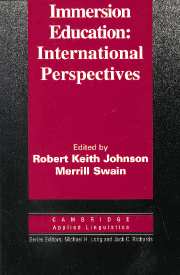Book contents
- Frontmatter
- Contents
- List of contributors
- Series editors' preface
- Preface
- Chapter 1 Immersion education: A category within bilingual education
- I IMMERSION IN A FOREIGN LANGUAGE
- II IMMERSION FOR MAJORITY-LANGUAGE STUDENTS IN A MINORITY LANGUAGE
- III IMMERSION FOR LANGUAGE REVIVAL
- IV IMMERSION FOR LANGUAGE SUPPORT
- V IMMERSION IN A LANGUAGE OF POWER
- VI LESSONS FROM EXPERIENCE AND NEW DIRECTIONS
- Index
Chapter 1 - Immersion education: A category within bilingual education
Published online by Cambridge University Press: 05 October 2012
- Frontmatter
- Contents
- List of contributors
- Series editors' preface
- Preface
- Chapter 1 Immersion education: A category within bilingual education
- I IMMERSION IN A FOREIGN LANGUAGE
- II IMMERSION FOR MAJORITY-LANGUAGE STUDENTS IN A MINORITY LANGUAGE
- III IMMERSION FOR LANGUAGE REVIVAL
- IV IMMERSION FOR LANGUAGE SUPPORT
- V IMMERSION IN A LANGUAGE OF POWER
- VI LESSONS FROM EXPERIENCE AND NEW DIRECTIONS
- Index
Summary
In this introductory chapter, we attempt to differentiate immersion from other types of bilingual education programs. We do this by first discussing briefly the development of immersion programs in Canada and the use of the term for an increasingly wide range of functions in different situations. Next we identify a set of core features, which we suggest are the defining characteristics of an immersion program. In actual programs, these features will be present to a greater or lesser degree, but all would be present in a prototypical immersion program. These features have implications for program development, teaching strategies, learning conditions, and learning outcomes. Next we consider a set of variable features, i.e., features that differ among immersion programs. These variable features have consequences for program outcomes. Finally, we pose some of the many questions that still need to be addressed in immersion research.
Our claim, explicit in the title of this book, is that the term “immersion” can be legitimately and usefully applied beyond its purely historical origins in Canada to a wide range of programs despite differences in their aims, socioeconomic contexts, and manner of implementation. There is nothing new, of course, about using a second or foreign language as a medium of instruction. Throughout the history of formal education, the use of an L2 medium has been the rule rather than the exception (Lewis, 1976). Until the rise of nationalism, few languages other than those of the great empires, religions, and civilizations were considered competent or worthy to carry the content of a formal curriculum.
- Type
- Chapter
- Information
- Immersion EducationInternational Perspectives, pp. 1 - 16Publisher: Cambridge University PressPrint publication year: 1997
- 67
- Cited by

